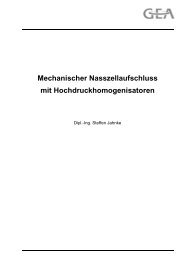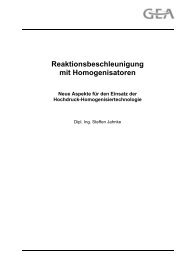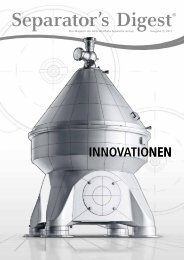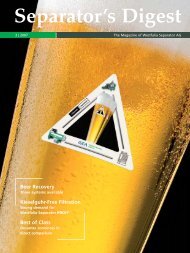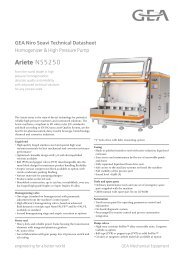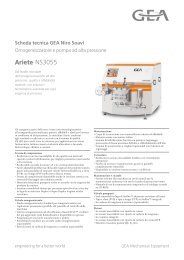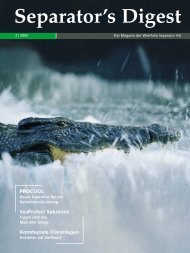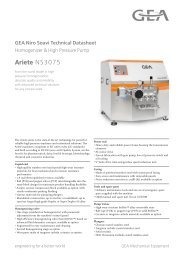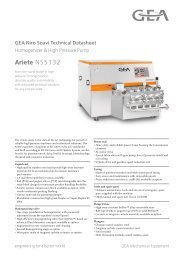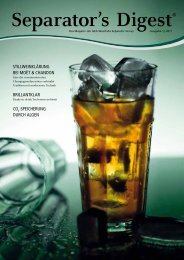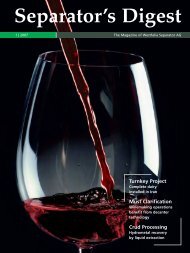Separator's Digest 2004/1 - GEA Westfalia Separator Group
Separator's Digest 2004/1 - GEA Westfalia Separator Group
Separator's Digest 2004/1 - GEA Westfalia Separator Group
- No tags were found...
You also want an ePaper? Increase the reach of your titles
YUMPU automatically turns print PDFs into web optimized ePapers that Google loves.
➤Process development by pilot-scale trialsTo be in a position to offer complete solutions to its customers, <strong>Westfalia</strong> <strong>Separator</strong> maintains its own centrifugal process technologydepartment (ZVT) in Oelde; this department is also responsible for investigating oil and fat products for their properties and ability tobe treated in centrifuges. It also cooperates closely with research and development as well as the various business units to develop newprocesses. It is also possible for pilot-scale trials to be run on small production installations with the customer’s products; these trials simulatethe subsequent process as closely as possible. ZVT is responsible for the machine trials and also for determining process parametersfor commissioning test installations; it is also responsible for performance tests with production installations and for generally optimizingprocesses.The production of biodiesel as analternative to mineral oil dieselis just as important as the productionof soaps and domestic products.Environmentally friendly processes forconverting vegetable raw materialsinto consumer durables are becomingmore and more important, and mechanicalseparation technology with separatorsis increasingly becoming the preferredtechnology. With a new processinvolving detergent-free dry fractionation,<strong>Westfalia</strong> <strong>Separator</strong> now offers areliable and environmentally friendlysystem that is able to replace the previousmethod of wet fractionation thatwas beset by problems. This new systemis equivalent to dry fractionation involvingfilter technology and providesconvincing arguments in terms of qualityand cost-effectiveness.Optimum adjustmentof olein qualityThe problem of processing with wetfractionation is the detergent: a surface-activeagent that harms the environment,should not be discharged ineffluent, and can only be partially recycled.For this reason, industry is movingtowards dry fractionation. In the past,this method has involved large filterinstallations (either vacuum filters ormore recently membrane filter presses).These are applications that separatethe crystallized fats or fatty acidsinto olein and stearin in two stages.With the stearin extraction processSTEP, <strong>Westfalia</strong> <strong>Separator</strong> now offersinnovative technology for separatingsolid stearin crystals from a liquid oleinphase with the aid of centrifugal forces.This method has many advantagesfor users.The main advantage is that theolein quality of special oils such as fishoil, butter oil or cocoa butter substitutecan be adjusted much more efficientlyto the desired customer specificationthan is possible with filters oreven filter presses. <strong>Separator</strong>s and filters/filterpresses have similar processingcapacities; however, the separatorprovides much better value for money.This is owing to the lower spare partand maintenance requirements, lowerinstallation costs, more compactdimensions and the possibility that acooling room might not be needed formaintaining the crystal fracture of thestearins.Product enhancement byway of additional benefitThe separator also offers the unbeatableadvantages of hygienic design andcleaning-in-place. Maintenance andcleaning times aloneenable the separatorto provide more productionavailabilityper year than a membranefilter press.The separator operatesautomaticallyand as a continuous process. As a very reliableproduction stage, separating technologyoptimizes the overall process.“STEP is the onlyseparator technologyin the world whichsuccessfully handles theprocess of olein/stearinseparation as dryfractionation.”The combination of crystallizationand the STEP process enables products tobe enhanced and also enables additionalbenefit to be created. For example,Olein from palm oil, which is liquid atroom temperature, is used as frying fatin commerce and industry.Oleins from butteroil can be mixedwith butter to obtain spreadable butter.Clear and concentrated olein, richin Omega-3 from fishoil, is used as avaluable food supplement. The possibleapplications of STEP are constantlyincreasing. ■Klaus-Peter EickhoffHead of Oils and Fats Processing<strong>Westfalia</strong> <strong>Separator</strong> Food Tec, OeldeTel.: + 49 25 22/77-23 84eickhoff.klaus-peter@gea-westfalia.de<strong>Separator</strong>´s World21<strong>Separator</strong>´s <strong>Digest</strong> 1/<strong>2004</strong>



